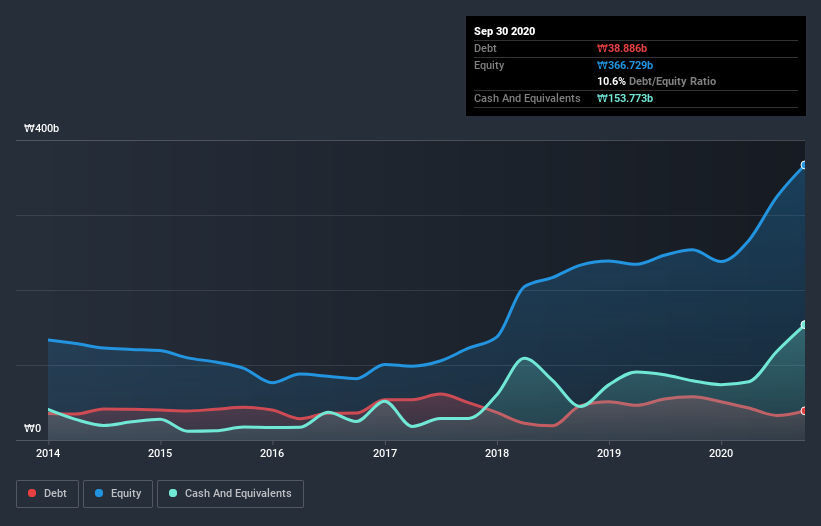- South Korea
- /
- Electronic Equipment and Components
- /
- KOSDAQ:A097780
Is S-MAC (KOSDAQ:097780) Using Too Much Debt?
Legendary fund manager Li Lu (who Charlie Munger backed) once said, 'The biggest investment risk is not the volatility of prices, but whether you will suffer a permanent loss of capital.' When we think about how risky a company is, we always like to look at its use of debt, since debt overload can lead to ruin. Importantly, S-MAC CO., Ltd. (KOSDAQ:097780) does carry debt. But the more important question is: how much risk is that debt creating?
What Risk Does Debt Bring?
Generally speaking, debt only becomes a real problem when a company can't easily pay it off, either by raising capital or with its own cash flow. If things get really bad, the lenders can take control of the business. However, a more frequent (but still costly) occurrence is where a company must issue shares at bargain-basement prices, permanently diluting shareholders, just to shore up its balance sheet. Of course, debt can be an important tool in businesses, particularly capital heavy businesses. The first step when considering a company's debt levels is to consider its cash and debt together.
View our latest analysis for S-MAC
What Is S-MAC's Debt?
The image below, which you can click on for greater detail, shows that S-MAC had debt of ₩38.9b at the end of September 2020, a reduction from ₩57.6b over a year. However, its balance sheet shows it holds ₩153.8b in cash, so it actually has ₩114.9b net cash.

A Look At S-MAC's Liabilities
According to the last reported balance sheet, S-MAC had liabilities of ₩49.9b due within 12 months, and liabilities of ₩21.8b due beyond 12 months. Offsetting these obligations, it had cash of ₩153.8b as well as receivables valued at ₩28.6b due within 12 months. So it can boast ₩110.7b more liquid assets than total liabilities.
It's good to see that S-MAC has plenty of liquidity on its balance sheet, suggesting conservative management of liabilities. Given it has easily adequate short term liquidity, we don't think it will have any issues with its lenders. Simply put, the fact that S-MAC has more cash than debt is arguably a good indication that it can manage its debt safely.
But the bad news is that S-MAC has seen its EBIT plunge 14% in the last twelve months. If that rate of decline in earnings continues, the company could find itself in a tight spot. The balance sheet is clearly the area to focus on when you are analysing debt. But it is S-MAC's earnings that will influence how the balance sheet holds up in the future. So if you're keen to discover more about its earnings, it might be worth checking out this graph of its long term earnings trend.
But our final consideration is also important, because a company cannot pay debt with paper profits; it needs cold hard cash. S-MAC may have net cash on the balance sheet, but it is still interesting to look at how well the business converts its earnings before interest and tax (EBIT) to free cash flow, because that will influence both its need for, and its capacity to manage debt. Happily for any shareholders, S-MAC actually produced more free cash flow than EBIT over the last three years. That sort of strong cash conversion gets us as excited as the crowd when the beat drops at a Daft Punk concert.
Summing up
While it is always sensible to investigate a company's debt, in this case S-MAC has ₩114.9b in net cash and a decent-looking balance sheet. And it impressed us with free cash flow of ₩23b, being 124% of its EBIT. So is S-MAC's debt a risk? It doesn't seem so to us. The balance sheet is clearly the area to focus on when you are analysing debt. However, not all investment risk resides within the balance sheet - far from it. Be aware that S-MAC is showing 2 warning signs in our investment analysis , you should know about...
When all is said and done, sometimes its easier to focus on companies that don't even need debt. Readers can access a list of growth stocks with zero net debt 100% free, right now.
If you’re looking to trade S-MAC, open an account with the lowest-cost* platform trusted by professionals, Interactive Brokers. Their clients from over 200 countries and territories trade stocks, options, futures, forex, bonds and funds worldwide from a single integrated account. Promoted
Valuation is complex, but we're here to simplify it.
Discover if Eco VoltLtd might be undervalued or overvalued with our detailed analysis, featuring fair value estimates, potential risks, dividends, insider trades, and its financial condition.
Access Free AnalysisThis article by Simply Wall St is general in nature. It does not constitute a recommendation to buy or sell any stock, and does not take account of your objectives, or your financial situation. We aim to bring you long-term focused analysis driven by fundamental data. Note that our analysis may not factor in the latest price-sensitive company announcements or qualitative material. Simply Wall St has no position in any stocks mentioned.
*Interactive Brokers Rated Lowest Cost Broker by StockBrokers.com Annual Online Review 2020
Have feedback on this article? Concerned about the content? Get in touch with us directly. Alternatively, email editorial-team@simplywallst.com.
About KOSDAQ:A097780
Eco VoltLtd
Develops, produces, and sells broadcasting and wireless communication devices in South Korea.
Flawless balance sheet and slightly overvalued.
Market Insights
Community Narratives



